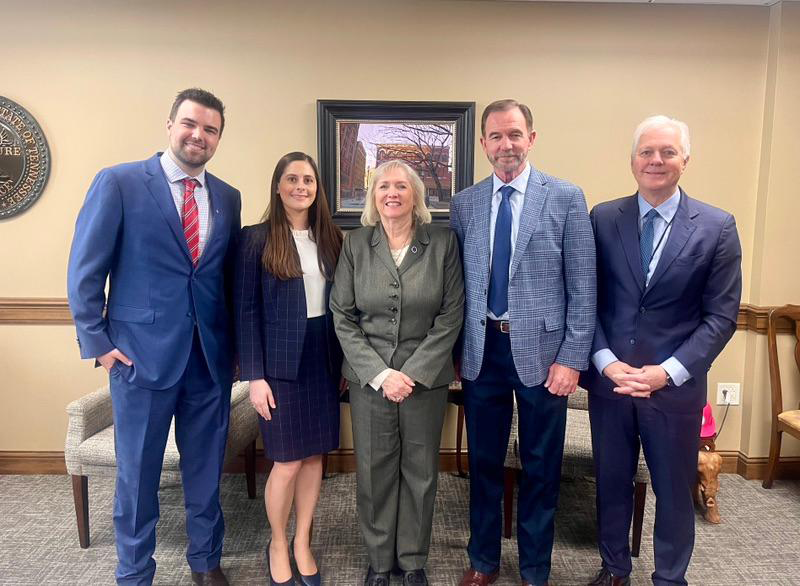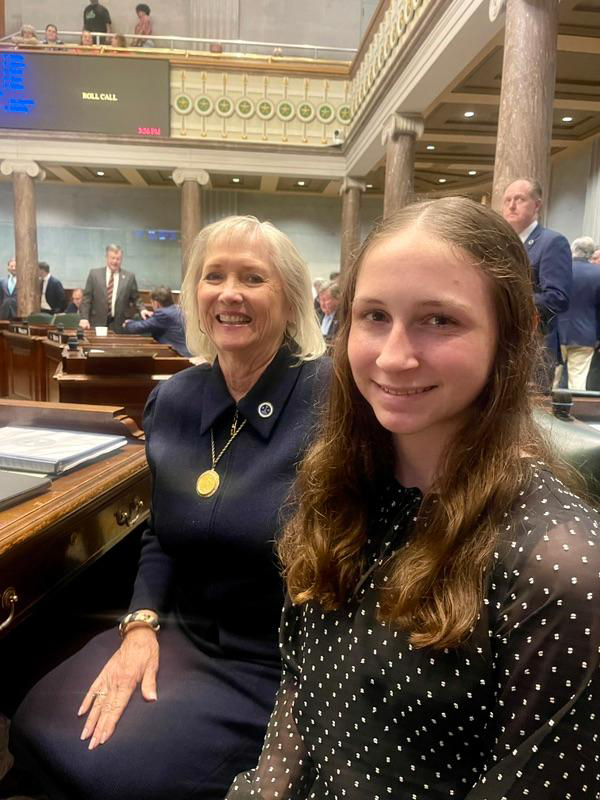
News from Nashville
Senate passes fiscally conservative, structurally balanced budget
Reaffirms commitment to education, public safety and tax relief
The state budget led a host of important bills approved by lawmakers last week as the 2024 legislative session nears closure. The Senate has completed the majority of its business and will address any remaining action this week.
Last week lawmakers fulfilled their constitutional requirement of passing a balanced budget. The 2024/2025 budget takes on no new debt and reflects lawmakers’ continuous efforts to cut taxes, maintain fiscal responsibility, protect public safety, prioritize education and invest in rural health.
This year lawmakers faced new budgeting challenges as state revenue collections have slowed. Fortunately, years of consistent conservative budgeting from Republican lawmakers enabled the state to be well-prepared to face declining revenues. Tennessee continues to be among the most fiscally stable states in the nation with no state income tax and low tax burden overall.
The budget accounts for a slowdown in economic growth by spending less and opting for one-time expenditures over recurring expenditures to lower the state’s financial obligations in the future. The $52.8 billion 24-25 budget total is $10 billion less than last year’s 23-24 budget.
Total legislative initiatives make up nearly $21 million in recurring investments and $141.5 in non-recurring expenditures. Overall, the legislative amendment spends 36% less than last year, with 76% less in recurring expenditures.
The budget also efficiently uses existing funding sources within the budget, such as TennCare shared savings and interest earnings, to reduce the reliance on general fund appropriations.
This budget also includes a $100 million addition to the state’s Rainy Day Fund, which serves as the state’s savings account to withstand economic downturns, bringing the fund to a historic level of $2.15 billion.
Notably, the budget includes the largest tax cut in state history with $393 million to repeal a portion of the franchise tax, which will help over 100,000 businesses across the state, including small businesses. It also sets aside $1.55 billion to account for potential tax refunds to qualifying franchise taxpayers within a three-year period.
The legislature also allocated $10 million to LaunchTN to support small business innovation and entrepreneurship.

Continuing focus on education
Once again, education is a top priority in the budget this year, with an emphasis on empowering parents and improving public education. For K-12 public education, the budget invests an additional $261 million to go into the TISA education funding formula. It also includes $125 million to keep the state’s commitment to raise the starting salary for every Tennessee teacher to $50,000 by 2026. This budget includes $144 million recurring for 20,000 education freedom scholarships. The budget also allocates $15 million for the Charter Schools Facility Fund.
Prioritizing public safety
A key aspect of this budget is to provide resources to keep Tennessee communities safe. Investments in public safety include:
- $17 million to add 60 new highway patrol troopers, supervisors and support staff
- $6.4 million for military border deployment of Tennessee National Guard
- $4.4 million for a legislative initiative to implement blended sentencing to address juvenile crime
- $1.5 million to fund a legislative initiative to reduce recidivism of repeat misdemeanor offenders
- $383,500 for a legislative initiative to collect data on the number of illegal immigrants in Tennessee from law enforcement agencies
- $15 million for grant pools for volunteer firefighters, rescue squads, and EMS
- $4.45 million for Youth Villages Violence Prevention Program in Shelby County
- 13 new positions for the TBI
Increase support to Tennessee hospitals and healthcare facilities
The slate of budget and legislative priorities includes significant investments in rural and behavioral health care with $80 million to strengthen rural health and $25 million for behavioral health. These funds will help to expand bed capacity, improve healthcare training and career pathways and expand access to behavioral health inpatient care. These priorities are funded through shared savings from Tennessee’s successful TennCare waiver, which allows the state to increase the efficiency and effectiveness of the TennCare program.
From TennCare reserves, the legislature allocated $97.7 million to support Tennessee’s hospitals and $12.3 million to support Tennessee nursing homes.
Rural Communities
There is $36 million in non-recurring grants to help distressed counties and rural communities with economic development, such as community asset improvements, marketing and downtown revitalization grants.
Preserving Outdoor Heritage
This budget allocates one-time spending for significant investments to preserve Tennessee’s natural beauty and outdoor heritage for generations to come. These proposed investments include:
- $59 million for Tennessee State Parks capital projects
- $51 million to the Heritage Preservation Fund to preserve land across this state
- $20 million to expand blue ways trail access through new recreational access points to Tennessee waterways
- $10 million to improve water quality at rivers, lakes and streams across the state, making them safe for future generations to enjoy and the
- $10 million to expedite the Bill Dance Signature Lakes initiative
- $5 million to protect and enhance scenic beauty along our major highways
- $3 million for Access 2030 to make Tennessee State Parks accessible to Tennesseans with disabilities
- $1.5 million authorized for pay raises for District Attorneys and Public Defenders
Legislative initiatives funded in the budget to support the state’s most vulnerable citizens include: - A measure that allows working individuals with disabilities to purchase health coverage through TennCare
- Legislation that requires the Department of Intellectual and Developmental Disabilities to administer a residential pilot program to house more than four persons with disabilities in permanent housing
- Increasing the personal needs allowance for long-term nursing home residents on TennCare from $50 – $70 per month

Jillian’s law passes Senate floor
As part of a strong push to improve public safety in Tennessee, a Republican bill would close a legal loophole for defendants found incompetent to stand trial. Senate Bill 1769, would require criminal defendants deemed incompetent to stand trial to be committed to an appropriate treatment facility. Current state law does not provide this requirement.
The legislation was introduced following the murder of Jillian Ludwig, an 18-year-old Belmont University freshman who was fatally shot while walking in a Nashville park on Nov. 7, 2023. Her killer, Shaquille Taylor, was a repeat violent offender who was deemed incompetent to stand trial for committing aggravated assault with a deadly weapon in April 2023. Because of this finding, Taylor was released from custody and went on to murder Jillian Ludwig later that year.
The legislation would additionally require individuals deemed incompetent to stand trial to be entered into the National Instant Criminal Background Check System, which serves as a namecheck database of people prohibited from buying or owning firearms.
The bill passed the Senate floor and awaits the Governor’s signature.
Senate advances legislation to provide support services for fifth grade students
The Senate passed legislation that will grant fifth grade students who are not adequately progressing in their English Language Arts (ELA) studies supplemental services throughout the year. I was a co-sponsor of this bill.
Each year, students take the Tennessee Comprehensive Assessment Program (TCAP) and other diagnostic tests to determine if they are meeting grade level standards. The General Assembly has previously enacted legislation that addressed reading deficiencies in children who entered school during COVID. This legislation makes accommodations for the students who might still be experiencing learning loss due to the pandemic.
Currently, if third grade students’ test results do not meet grade-level standards, they can move on to fourth grade with special services like tutoring or summer school. After completing these services, it is expected that these students will catch up to grade-level standards.
Under Senate Bill 2183, if a student does not meet standards after the fourth grade, the parent, teacher, and principal – the individuals closest to the student – will consult to determine if the student should be held back or advance to the fifth grade with the same support services received in fourth grade.
The legislation would be repealed on July 1, 2025, so the General Assembly can continue reviewing education standards and data in the coming years to determine the best policy for students’ education.

In brief…
Criminal Injuries Compensation Act passes – The Senate passed legislation that will help streamline victims’ ability to obtain compensation for damages brought on by their perpetrators. Senate Bill 1416, expands the time frame under the Criminal Injuries Compensation Act for a crime to be reported by the victim from two days to fifteen days.
The Criminal Injuries Compensation Act provides funds of last resort to financially assist innocent victims of crime with personal injuries. Current law only allows a victim 48 hours to report these offenses. Under this legislation, victims would have a more reasonable amount of time and ability to report the offenses and damages against them.
The law also expands the amount of documents a victim may submit in order to prove the crime occurred. Current law only allows this provision for victims of human trafficking. The legislation heads to Governor Lee’s desk for his signature.
Child Victims’ Privacy Act – The Senate passed legislation to protect the privacy of child victims of violent crime and their families. The Child Victims’ Privacy Act, ensures county medical examiner and autopsy reports of minors who are victims of violent crime remain private except in certain circumstances. The bill protects sensitive information generally included in autopsy reports like a victim’s medical history, photos, toxicology, and communications with family members and law enforcement. It allows for in-person inspection of these autopsies with the provision that no photocopies or electronic images can be taken of the reports by the person viewing them. The reports could still be released in certain circumstances, including when a parent or guardian is not a suspect in the death of a child and gives explicit consent. A court may also order the release of the records upon showing good cause. The bill now awaits Governor Lee’s signature.
Increasing availability of SROs – Currently, over 500 Tennessee schools are without a school resource officer (SRO), even though the state provides grant funding to place an SRO in every Tennessee public school. To help alleviate this safety risk for these schools, this legislation that would help fill this gap and provide more schools with equipped officers.
Senate Bill 2901 would allow a retired law enforcement officer who is a member of the Tennessee Consolidated Retirement System (TCRS) or local retirement fund to be reemployed as a full-time SRO at a Tennessee public school without loss or suspension of the officer’s retirement benefits. This legislation passed the Senate floor last week and awaits the Governor’s signature.
Protecting against voter fraud by illegal immigrants – The Senate passed legislation ensuring illegal immigrants are not able to vote in Tennessee. Senate Bill 137 requires the coordinator of elections to compare the statewide voter registration database with the Department of Safety’s database to verify illegal immigrants are not registered to vote.
Increasing Property Reappraisal Freedoms for Counties — This legislation that will allow property assessors to choose the cycle length of property reappraisals. Currently, reappraisal runs on a three-to-six-year cycle, but the bill revises the schedule to operate on a one-to-four-year cycle. This revision provides counties with an option to reevaluate property values on a more frequent basis. Senate Bill 1946 passed the Senate floor last week.
DUI enhancements: On Thursday, the Senate floor passed legislation that increases penalties for intoxicated drivers. Senate Bill 1055, increases the jail time requirement for drunk drivers from two days to seven days if their blood alcohol content (BCA) is equal to or higher than .15 The bill is still moving through the House.
Violation of bond conditions: Senate Bill 2563, would make it a Class A misdemeanor for an individual who is out on bond to violate the conditions of their release. This change would allow law enforcement to arrest an individual who is suspected of violating the conditions of their release instead of having to wait for the district attorney’s office to file a motion and schedule a court hearing which could take weeks. The bill passed the Senate floor and is advancing through committee in the House of Representatives.
School nurses: Legislation that would increase transparency of the number of school nurses in Tennessee passed the Senate floor. Senate Bill 2703, requires a local education agency that does not contract or hire at least one nurse for every 750 students to submit a report to the Department of Education explaining their decision. State law requires each school district to have at least one permanent, full-time school nurse. More than 450 schools across the state currently do not have one. The bill now awaits the governor’s signature.

Bills Previously Covered that Passed the Senate Floor
- Senate Bill 1709 – would enhance the punishment for assault in healthcare facilities to a Class A misdemeanor and aggravated assault in healthcare facilities to a Class C felony.
- Senate Bill 1762 -would allow TennCare to cover medical expenses for genetic testing to identify treatments for children with rare diseases.
- Senate Bill 1867 – known as the Beyond Ordinary Learning Opportunities Act, would require the Tennessee Department of Education (DOE) to create a one-year pilot program that would place a therapy dog in five public schools statewide.
- Senate Bill 1963 – would allow courts to impose fees on a governing body if the court finds that the governing body knowingly and willfully refuses to comply with open meeting laws.
- Senate Bill 1972 – would require aggravated assault suspects in certain domestic violence cases to wear a global position monitoring system (GPS) if they are released on bond.
- Senate Bill 2044 – would ensure that an inmate’s actual sentence could not be reduced with good-time credits.
- Senate Bill 2770 – would allow a judge to sentence an illegal immigrant to life without parole if convicted of a violent crime or if a deadly weapon was involved in the offense.
- Senate Bill 2797 – seeks to enhance public safety by allowing retired officers to carry firearms at all times.





Legislation I’m Sponsoring
Ben Kredich Act aims to prevent impaired driving by those treated with Narcan
The Senate unanimously passed legislation last week to clarify that patients who have been treated for a drug overdose with Narcan could still be impaired and charged with driving under the influence, as drugs would still be present in their system. Senate Bill 2116, which I sponsored, instructs first responders who administer an opioid antagonist such as Narcan to an individual experiencing a drug overdose may provide information on the risk of driving within a 24-hour period.
The legislation is named after Ben Kredich who tragically lost his life after being struck by a driver who fell asleep at the wheel after being administered Narcan for an opioid overdose in a hospital earlier that day. The driver was unaware of possible side effects of Narcan and that the drugs causing the overdose would remain in his system for at least 24 hours.
Expanding Mental Health Coverage
SB 2801 would expand health coverage for those in need of mental health services. The legislation would require TennCare to cover mental health services at the same coverage rate for alcoholism and drug dependent patients. Senate Bill 2801 passed the Senate floor and awaits passage in the House of Representatives.
Requires a TennCare health benefit plan issued by a health insurance carrier to provide coverage and reimbursement for mental health services and treatment to the same extent that the TennCare health benefit plan provides coverage and reimbursement for the treatment of alcoholism and drug dependence.
A PSA on National Work Zone Safety Week



If our office can ever be of service to you or your family, please don’t hesitate to contact us. On the left is Carly Nelson, my Legislative Assistant. On the right is Debbie Gazzaway, our Research Analyst for the Transportation and Safety Committee. We can help with issues with a state department, information on legislation, setting up a tour of the Capitol or scheduling an appointment or speaking engagements.
For information on State Senators including phone numbers and email addresses, click Tennessee State Senators.
For House members, click Tennessee House Members
For all other information on the General Assembly including legislation, schedules and videos, click Tennessee General Assembly
As always thank you for continued support!
Sincerely,
Becky Massey
District 6 Senator
615-741-1648
sen.becky.massey@capitol.tn.gov
